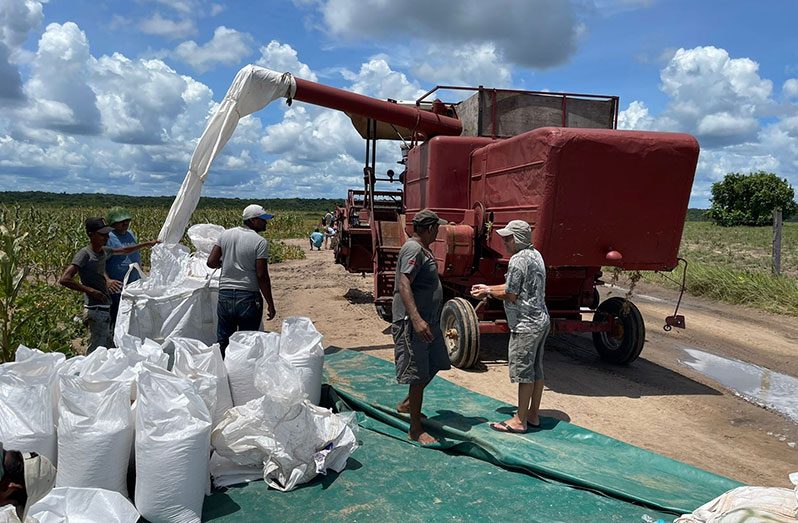THE massive soya bean trial farm at the Dubulay Ranch at Ebini along the Berbice River has begun to bear fruit, literally. Not only that: the yields of up to two tonnes per hectare is of good, export quality, according to Agriculture Minister Zulfikar Mustapha. “The harvesting is going well,” he said.
The minister told the Guyana Chronicle last evening that although the crops are just part of a trial run to produce soya bean and corn, the initial results show that Guyana has the potential to supply at least the Caribbean Community (CARICOM). “That’s good news for Guyana,” Minister Mustapha said.
He noted that with improved husbandry methods, the crops that follow will be of even better quality. “Next year, the yield and so will be better,” Minister Mustapha posited.
The 115-acre cultivation, which is being undertaken by a group of local investors, came on stream after President Dr. Irfaan Ali announced the government’s intention to be self-sufficient in protein for the poultry industry.
The Head of State had also related that incentives will be made available for private individuals interested in coming on board with the government’s vision for development of the sector.

With Guyana now taking the lead on advancing the agri-food systems agenda in CARICOM, the government is keen on finding ways to reduce the country’s and CARICOM’s food-import bill. Guyana currently expends close to US$25 million annually on protein for the poultry sector.
The group of investors who have answered the President’s call include the owners of Guyana Stockfeed Limited, Royal Chicken, Edun Farms, SBM Wood, the Dubulay Ranch, and Bounty Farm Limited, along with the Brazilian-owned N F Agriculture. Assistant Managing Director of Bounty Farm Limited, David Fernandes, said that it was important for the team to commence trial of the two key inputs so that sufficient data could be gathered for the larger investment
During a visit to the farm back in September, President Dr. Irfaan Ali described the trial production as being “remarkable.”
“This is just the start. We have to now replicate this 10-fold in the next crop, and then, of course, after that we move to increase, incrementally, until we get up to the full production,” Dr. Ali had said.
He added: “We have to get up to 75,000 acres for us to move to full production locally.” Reports are that studies are ongoing to determine the technical and scientific requirements to achieve the expanded target, especially in keeping with the safeguards needed against climate change.
Meanwhile, the Ministry of Agriculture has begun preparatory works on the Tacama Savannah, which is expected to host the commercial corn and soya bean farms.
As part of the 2021 national budget, some $500 million was allocated to improve the requisite infrastructure, and according to Minister Mustapha, the contract has already been awarded to construct the main access road into the savannah.
Added to that, the minister said that government will soon be assisting investors to build silos to store the grains.
Additionally, owing to the success of the trial farm, Minister Mustapha wants to establish a joint effort, which will see students from the Guyana School of Agriculture (GSA) benefiting from training exercises at both the Dubalay Ranch and the Tacama site.
Minister Mustapha said that with the level of technology employed on the ranch, it would benefit the country as a whole to have students who are studying agriculture being exposed to such advanced levels of technology. He said that his ministry has already discussed the possibility of having interns on the project.
“This initiative will also be extended to students from the University of Guyana and other relevant agencies… I’m sure our students will be able to learn a lot. Theory is important, but the practical aspect of agriculture is also very critical in ensuring all-round development,” Mustapha emphasised.
Nonetheless, over the next four years, the government is preparing to work with several private individuals and groups to develop various mega-farms to propel production and reduce the annual food-import bill in its entirety.




.png)









